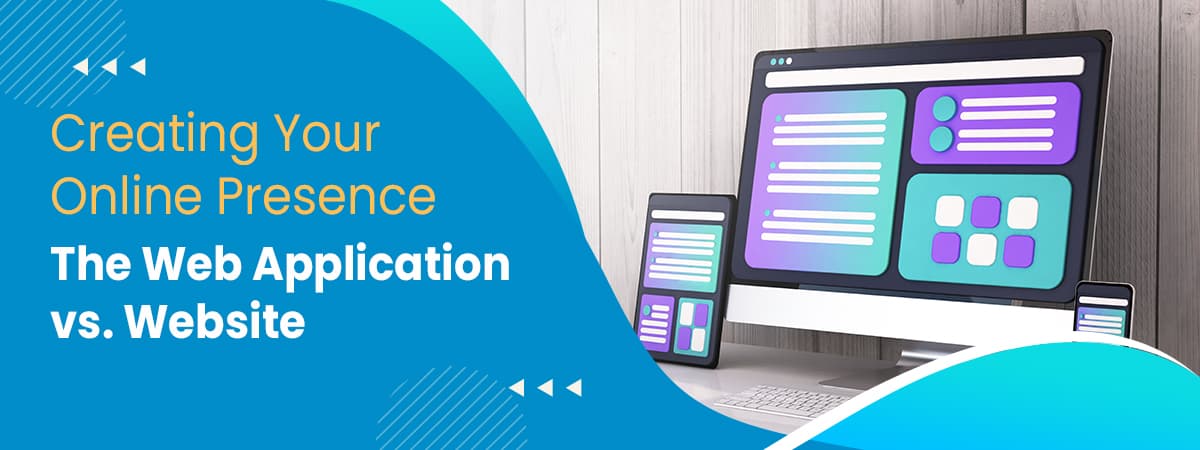
Establishing a strong online presence is crucial for organisations looking to stay competitive in today's fast-changing digital market. Web apps and webpages are two common options for this purpose. As businesses and developers struggle to choose between the two, the fight of Web Apps vs. Websites continues. Let’s go into the specifics of each choice, analyse their benefits and drawbacks, and throw light on the role of AI app builders and app builder software in the decision-making process.
Knowing the Fundamentals
Understanding the distinctions between websites and web applications is essential to making informed decisions about your digital strategy.
Distinction between Websites and web applications
Websites function as online business cards, acting as digital brochures that provide visitors with information. Websites are static, made up of linked web pages that may produce information on their own without requiring a large amount of user interaction. Their main purpose is to provide information, display goods or services, and act as an online store for prospective customers.Increasing reputation and brand exposure need websites.They are essential for businesses attempting to establish an online presence and for providing potential customers with a place to start when researching their organisation.
Conversely, web applications are dynamic, interactive platforms that go beyond the static nature of web pages. Web applications use interactivity, data processing, and advanced capabilities to provide users with a more engaging experience. Web applications include social networking sites, online banking platforms, and e-commerce websites.
Unlike websites, web applications are meant to manage data, simplify tasks for users, and offer personalised experiences. The combination of AI app builders and app builder software allows businesses to create intricate and captivating digital solutions, making this possible.
Websites vs. Web Applications in the Digital combat
Purpose and Functionality
For companies who want to primarily display information online, websites are perfect. They work well for displaying static material, including product lists, business histories, and contact information. On the other hand, web apps are made to fulfil certain tasks and accommodate user engagement. Web applications may be a better option if your company has to automate tasks, do intricate calculations, or process data according to the needs of individual users.
User Engagement and Interactivity
Websites are informative centres that act as a company's public face. They may have comment sections or contact forms, but their main objective is to spread knowledge. Web apps, on the other hand, are highly dependent on user interaction. They enable active user interaction, such as form submission, transaction processing, and document collaboration. To maximise user engagement, a web application can be essential.
Development and Maintenance
The development of websites is typically faster and less expensive than that of web apps. The only expertise needed to create a website is front-end development, thus even small enterprises may use them. On the other hand, building web apps requires both front-end and back-end development, which frequently calls for a larger time and financial commitment. Another consideration is maintenance; although web apps may require continuous support for new features and functionality, webpages are simpler to maintain.
The Significance of AI App Builders and Apps Builder Software
Businesses looking to decide between a website and a web application may use application builder tools and AI app builders to expedite the development process. With their drag-and-drop interfaces, automation options, and pre-built templates, these technologies make it easier to create digital solutions.
Rapid Prototyping and Development
AI app developers like Tbuilder are excellent at fast prototyping, which enables companies to see their digital solutions in action. These solutions frequently come with templates for both web apps and websites, so users may select what best suits their needs. Businesses may utilise these platforms to speed up the development process and launch their digital solution more quickly because of their user-friendly interface.
Cost-Efficiency
AI app builders may be a more affordable option for companies on a tight budget. Through the automation of specific development process steps, these technologies lessen the requirement for complex coding and technical know-how. Because building web apps has become more accessible, a wider spectrum of organisations may now offer digital solutions without having to break the bank.
Adaptability and Customization
Software for creating apps provides a mix of customisation and flexibility. These technologies let companies customise digital solutions to meet their unique needs while also offering pre-built components for speedy development. This adaptability is essential when choosing between a website and a web application since it lets companies modify the functionality and degree of engagement to suit their requirements.
Verdict
There is no standard solution when it comes to the debate between web applications and websites. The decision is based on the particular objectives, capabilities, and assets of the company. Utilising AI app builders and app builder software may greatly streamline the development process, enabling companies of all sizes to access digital solutions.
Websites and web apps may become more similar as technology develops, giving businesses hybrid alternatives. To ensure that the platform selected satisfies both corporate and consumer objectives, it is imperative to align digital strategy with business goals.
With Innovative AI app development platforms like Tbuilder, creating a web app is simple and doesn't need coding, making it an easy and user-friendly process for companies trying to implement digital solutions.
